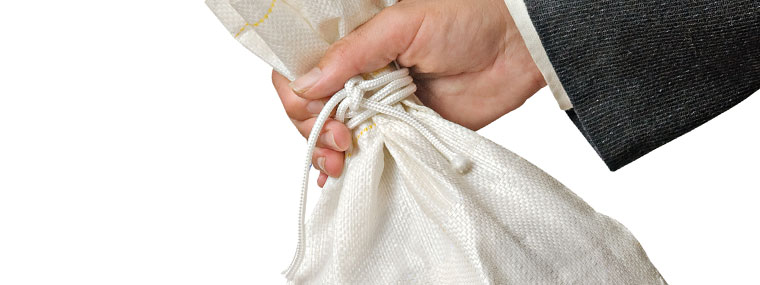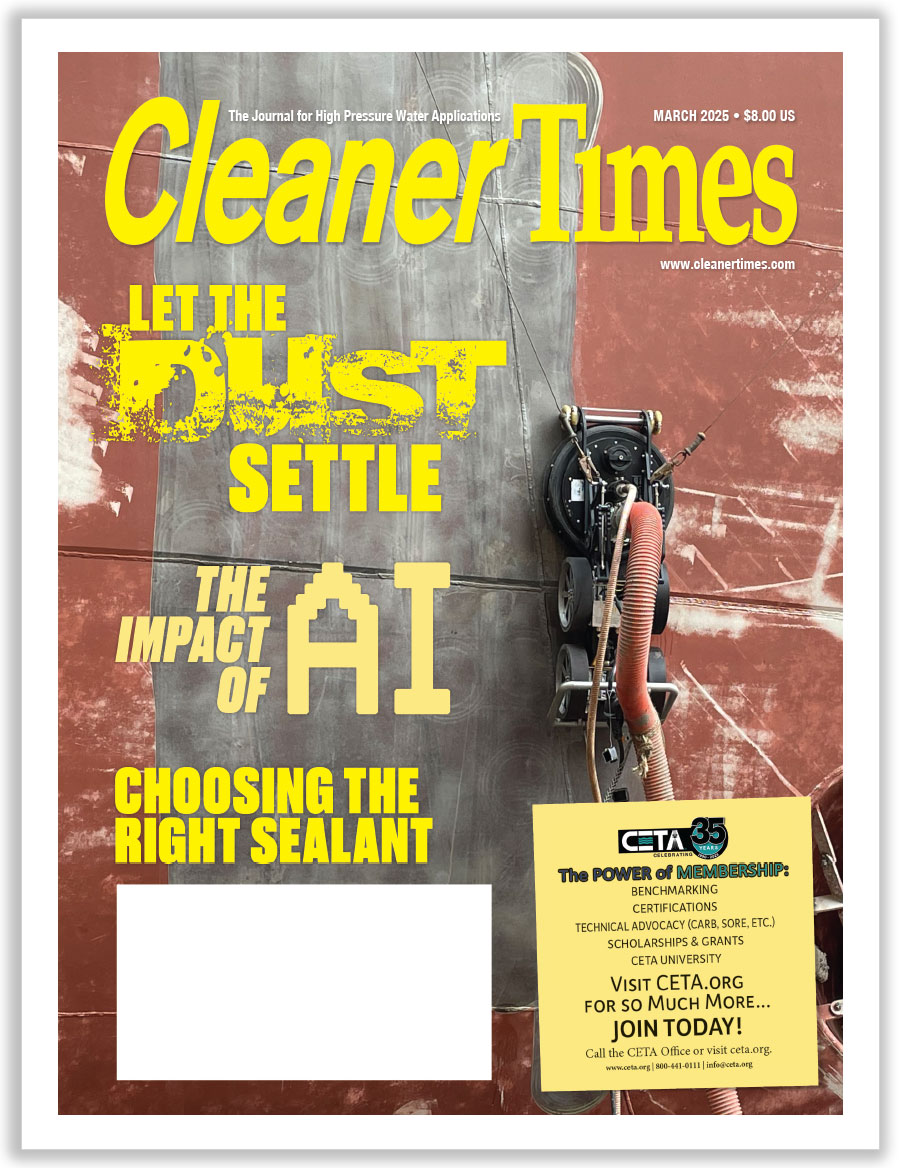
Liability Protection
By Diane M. Calabrese / Published July 2021

Legally bound. Obligated. Ominous sounding, are they not? Anything can happen. When it does, litigation may follow.
A contractor might look away from a ladder for a second, only to be startled by the sound of it toppling onto a child who had been tugging at it. The child was nowhere to be seen prior to the mishap.
Contractors, distributors, and manufacturers all require liability protection. For manufacturers, which may have cradle-to-grave liability for their products, awareness is high. Other members of our industry may benefit from taking a critical look at their level of risk.
“For the most part, I see contractors making the mistake of just getting any liability policy they can,” says Doug Rucker, owner of Clean and Green Solutions in Porter, TX. “As a result they are not always covered for the actual damage they could cause.
“Care, custody, and control, along with broad form property protection, are left off or not included,” continues Rucker. “This means most of the damage a contractor could cause may not even be covered.” But there is potentially a worse-case approach to getting insufficiently comprehensive coverage. That is getting no policy at all.
“The biggest mistake is starting a pressure washing business and not even having insurance,” says Rucker. “The last few years we have spent a lot of time trying to educate the public about the importance of checking to make sure that the contractor is fully insured, and the policy is in force.”
Good and safely attained outcomes fortify not only the individual contractor but also the industry. Rucker says that he has seen “way too much damage caused by underinsured and undereducated new ‘business’ startups.”
There is no reason for contractors to not be informed. They can turn to their professional organization for information to get going on the learning curve.
“While discussing insurance for a pressure washing business owner, I highly suggest not only discussing with their agent but also following up with colleagues as well as a business entity attorney,” says Rucker. “In the end, I refer everyone to Joe Walters Insurance due to their extensive experience insuring pressure washing businesses.”
Joseph D. Walters Insurance is located in Belle Vernon, PA. The company has assisted contractors in our industry with their insurance needs since 1978. And today it insures some 4000 power-washing contractors.
“Joe Walters Insurance website is a great website with a lot of education for business insurance,” says Rucker. “Their staff is always very helpful as well as very well educated.”
Foresight
The tired adage that hindsight is 20/20 nevertheless applies to liability protection. “If only” becomes a useless lament after an event occurs. Twin goals are to avoid an adverse event and to be sufficiently protected to recover should an adverse event occur.
“Contractors need to understand that as service providers, for anything that happens while performing
their service, they can be liable,” says Linda Chambers, brand and sales manager at Georgia Chemical Equipment in Norcross, GA. “And, therefore, they need to protect themselves, their employees, and their business with insurance to cover all consequences and for enough money.”
Chambers points to the “enough” component as essential. “The biggest mistake is to lowball the payout coverage to have a low premium rate,” she explains.
When talking with an agent and formulating the structure of a policy, contractors must also be scrupulously honest with themselves. Do they ever use a piece of equipment in a slight departure from what the manufacturer recommends? What about a chemical?
If the answer to either question is “yes,” the contractor must carry liability protection that covers use of equipment and chemicals. “Many times, contractors use chemicals ‘off label,’” says Chambers. “In other words, for a job or using an amount not listed on the product label following manufacturer’s directions.”
Should something go wrong, off-label use poses an additional risk. “Anything off label would not generally be covered by a manufacturer, but would fall fully on the contractor,” says Chambers.
Assessment of a business—no rose-colored glasses—should start the process of finding appropriate liability protection. It is the only way to accurately appraise requirements.
“Contractors need to make a list of all equipment and chemicals they use, and how they use them,” says Chambers. “Then check to see if that use is covered by the manufacturer or not. But never rely on a manufacturer to come through for a claim.
“Next, list what could possibly go wrong, and calculate what the reasonable cost would be to correct or replace any damage,” continues Chambers. “After that speak with an agent versed in insurance coverage specifically for pressure washing.”
Foresight is about more than obtaining liability protection in the form of insurance. It’s about reducing risk.
A contractor should do everything possible to reduce the chance of a claim, says Chambers. What does she recommend?
“First, have as much as possible covered in the contract before the customer signs for service,” says Chambers. “Cover things like not being responsible for items left out by the customer, cars left in the driveway, people or pets that wander into your cleaning area while work is in progress, etc.”
In addition to limits of responsibility in the contract, be sure to fully understand the layout of the premises before beginning a job. Surprises of any sort at a jobsite usually are tied to an increased risk.
“Walk the job with the customer before cleaning or during the quote,” says Chambers. “Point out areas where the customer might come back after cleaning claiming damage, such as oxidation of siding or gutters; chipping paint; failing sealers; unsafe outside outlets, switches, or light fixtures; etc.”
Even on residential jobs—and perhaps especially on such jobs—use signage and warning tape to keep passersby at a safe distance. Emphasize to property owners that safety depends upon everyone—adults, children, and pets—respecting the perimeter established.
Structure and Substance
To some extent, the structure of a business can afford protection to individuals in the business if there is a liability claim. It’s a tricky area, and the attorney thoroughly advised about the nature and scope of the business will be the source of the most precise information.
Many a contractor began as a sole proprietor. For a contractor that does not register as any other kind of legal entity, sole proprietorship is the default category.
In the business lexicon, a sole proprietorship is not recognized as a separate business entity. Business assets and liabilities and personal assets and liabilities are not separated.
Because it’s difficult to raise capital or borrow money from a bank, most contractors who make a sort of test run of the market as a sole proprietor change structures when they meet success. A sole proprietorship can be risky because debts and obligations incurred by the business can become the personal responsibility of the owner.
Many contractors move to a limited liability company (LLC) structure as soon as it becomes clear they will make a go of their enterprise. The LLC provides protection of personal assets, such as home, car, and savings (most of the time) if there are lawsuits.
The varied types of business structure include partnerships, corporations, and nonprofits. And there are subcategories of each. Liability and taxes differ for each type. In the realm of liability protection, it is important to know whether a particular structure confers advantages (reduces exposure) or whether a structure leaves an owner more vulnerable (increases exposure). Then, insure accordingly.
[Readers new to the industry and still weighing business structure will benefit from the two-part article “Which Structure Is Best for My Business?” (December 2014 and February 2015 Cleaner Times) by Beth Borrego.]
Clarity on the type of structure enables a serious assessment of liability protection requirements. (Note: When considering the parameters of a business structure, take full account, which includes state-level expectations/requirements that might be in addition to federal ones.)
The U.S. Small Business Administration (SBA.gov) offers guidance on types of insurance required according to business structure, but even the SBA strongly advises consulting with insurance agents to determine/verify needs.
Here’s the short list of what the SBA recommends: general liability insurance for any business; product liability insurance for manufacturers, wholesalers, distributors, and retailers; personal liability insurance for entities that provide customer service; and commercial property insurance for property and physical assets. (See https://www.sba.gov/business-guide/launch-your-business/get-business-insurance.)
SBA also recommends four steps on the path to purchasing insurance. One, assess risks. Two, find a reputable agent. Three, shop around. Four, reassess risks annually.
Steps two and three merit a bit more consideration. A reputable agent may be one who works regularly with businesses of the same type or has a special tie to the industry, as the Joseph D. Walters Agency. Absent a special tie, however, an agent who strives by asking questions to get a full understanding of the business
is a must.
As for shopping around, some states exert rigid control over pricing of coverage options in policies. Even so, the shopping is a good way to find a good working-relationship fit with an insurer.





